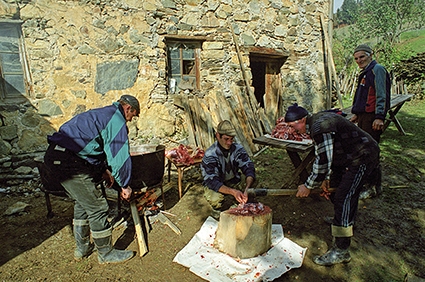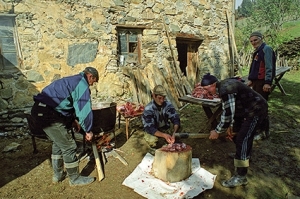Of Dead Food Critics: Svaneti
How's this for a culinary challenge? You must make the best feast ever, annually, over several days. Your guests are the dead from your own family, whose spirits return for the occasion. Who from your living family members LIVES and who DIES in the next year will be based on their reaction. (They go away in the middle of it all and discuss the respective feasts with other ghosts). C'mon, Svans, are you Orthodox or not? Case in point.
January 18 was the holiday locally called Lisgvjinaal, described in a recent Georgian article which I had my wife check out for me as "hosting the dead". The author was an up-and-coming director of a Svan language film, Dede, based in Ushguli, which is hitting the international film festival scene and getting considerable recognition. I gleaned more information from an Etseri source to balance things out.
Like many Svan traditions, this one started in the unknown past; there no news exited the province for most of the Middle Ages. Taking place after the "Old" New Year of January 14, one must clean all stoves and cooking surfaces of oil, as no fats are allowed in the first stage of cooking. If three-legged furniture is available to use, it is used.
One important dish from old times, now probably not made at all anymore, included cannabis. This was first roasted then ground with a pestle and mortar; you would add some water, heat it, mix, skim, and add cheese, ending up with a hippie version of khachapuri (Georgian cheese bread). This was the only dish with any fat allowed in it. Then followed the big family supra (feast), including cannabis oil as well, and all dishes and recipes involving the best foods. Candles were lit, and there had to be lobiani (bean bread) and a triple libation of wine poured out. The head of the family opened the door and welcomed the dead in for the whole event, which would involve daily feasts for between three and seven days.
The second day was a kind of "announcement'. It was not to be held after Jan 19, and was not a "fasting" feast, meaning that all foods and ingredients were allowed.
On the Monday, the spirits would leave the house to compare feasts with those of other families and discuss the life or death fates of all family members. Families asked them for peace, of course. Sunday saw their return, and there had to be warm porridge; they would stay until dawn, then depart until the next year (or event!). Already prepared food needed be reheated for them, and they would partake of it until leaving. There were no expectations of seeing food invisibly being eaten, but it was all done anyway. There must be araqi (moonshine) available for them at this time. As they left, you could look for their footprints in the new snow.
There would be a separate feast for the family children so that they didn't bother the dead, although apparently children's laughter was not forbidden, as it made the dead happy. If all of this was not done, or not "up to snuff", you would have no peace in your heart; no wonder, as who knew who might die as a result? You would apologize profusely to the dead and hope for the best.
Whew! Hey, you can believe what you like, but this seems a heavy performance-based burden with potentially disastrous consequences for failure of any kind. Practice for what the book of Revelation in the Bible calls the Marriage Supper of the Lamb, apparently one of the first events in the eternal period of the finished Heaven? Perhaps not, because that event seems to be entirely devoid of pressure to "get it right"; by then, those whose place is in Heaven are already there, and the rest have excluded themselves. I'm not even saying that you have to be Orthodox, or Christian at all. But if you CALL yourselves Orthodox, Svans... I'll let someone else finish that sentence.
Tony Hanmer has lived in Georgia since 1999, in Svaneti since 2007, and been a weekly writer for GT since early 2011. He runs the “Svaneti Renaissance” Facebook group, now with over 1350 members, at www.facebook.com/groups/SvanetiRenaissance/
He and his wife also run their own guest house in Etseri:
www.facebook.com/hanmer.house.svaneti
Tony Hanmer











